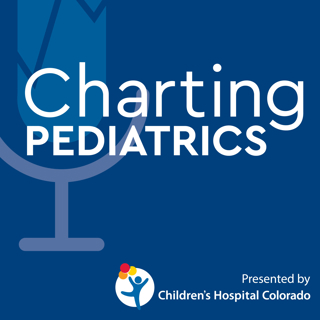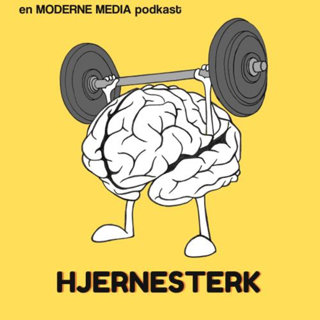
Bronchiolitis (S1:E23)
In this episode we're discussing bronchiolitis with Monica Federico, MD, Medical Director of both the Asthma Program and Clinical Alignment at Children's Colorado. Dr. Federico is also an associate professor of pediatrics and pulmonary medicine at the University of Colorado School of Medicine. In this episode: How to diagnose the classic presentations of bronchiolitis How providers can identify the significant signs of respiratory distress How to utilize the Bronchiolitis Clinical Pathway (.pdf) from Children's Colorado When to use bronchodilators and steroids for treatment Identifying children who are most likely to develop bronchiolitis
30 Jan 201826min

Adolescent Bariatric Surgery with Dr. Thomas Inge (S1:E22)
Today on the podcast, we're discussing adolescent bariatric surgery with Thomas Inge, MD. Dr. Inge is the division head of Pediatric Surgery and the Director of the Bariatric Surgery Center at Children's Colorado, as well as a professor at the University of Colorado School of Medicine. In this episode: Where bariatric surgery fits within available options for the morbidly obese adolescent patient Common medical indicators that a patient could be a successful candidate for bariatric surgery, as they indicate general readiness and suitability to a primary care provider Key contraindications for bariatric surgery The impact of patient age and how to assess maturity, both skeletal and psychological The types of bariatric operations that are suitable for adolescents What the Multicenter Teen-LABS study, led by Dr. Inge, means for adolescents
16 Jan 201828min

Neonatal Jaundice and Bilirubin Levels in Newborns (S1:E21)
Today on the podcast, Dave Scudamore, MD, joins us to talk about neonatal jaundice. Dr. Scudamore is the Director of Inpatient Medicine for the Network of Care at Children's Colorado, and he is also an assistant professor of pediatrics in hospital medicine at the University of Colorado School of Medicine. In this episode: The major risk factors for severe jaundice that can cause complications with neonates How to assess mom and baby for the risk factors of neonatal jaundice by reviewing patient history and birth data Difference between the risk factors for elevated bilirubin and the risk factors for neurotoxicity The significance of the ratio between albumin and bilirubin Standard protocols for bilirubin workups and monitoring for risk factors How you can provide elevated patient care by using a patient-centered care approach and considering the context of the case The way to utilize the Bhutani curve to assess risk and the AAP guidelines to initiate phototherapy Understanding the importance of follow ups and their role in intervention
26 Des 201724min

Noisy Breathing in Pediatric Patients (S1:E20)
In this episode, Jeremy Prager, MD, talks us through a common issue in pediatric patients — noisy breathing. He outlines the underlying causes and presentations of, as well as available treatment options for noisy breathing. Dr. Prager is a pediatric otolaryngologist, Director of the Aerodigestive Program at Children's Colorado and associate professor of otolaryngology at the University of Colorado School of Medicine. In this episode: How an ENT defines noisy breathing Categorizing noisy breathing into age groups The presentations of noisy breathing the infants and toddlers age group The presentations of noisy breathing the school-age children age group Audible examples of a stridor sound versus a stertor sound Questions providers should ask when seeking the cause of noisy breathing The relationship between pediatric obesity and sleep apnea Diagnostic exams and tests that providers can run before a consultation Treatment options available to a child with noisy breathing The effectiveness of natural remedies and oxygen therapies
19 Des 201721min

Top 10 Pediatric Rheumatology Diagnoses (S1:E19)
Today Robert Fuhlbrigge, MD joins us to discuss the 10 most common pediatric rheumatology diagnoses. Dr. Fuhlbrigge is the Chair of Rheumatology at Children's Colorado and professor of pediatrics and rheumatology at the University of Colorado School of Medicine. In this episode: What swollen joints can indicate when assessing potential diagnoses in the realm of rheumatology The most common identifier in determining a systemic problem The role of morning stiffness in the differential diagnosis The difference between mechanical pain and inflammatory disorders Defining how helpful an elevated ANA is in treating a patient with Lupus Outlining the best tests for inflammation: CSR, CSR and ANA Why rheumatologists find unexpected fevers in children interesting Unexplained weakness and what it means Which rashes may indicate that it's necessary to refer to rheumatology The role fatigue plays in the rheumatology world Usefulness of radiology studies, MRI, CT and other imaging modalities Helpful apps clinicians use for rheumatological diseases today The role of genetics and development in rheumatological diseases
15 Des 201733min

International Adoption Medicine (S1:E18)
On today's episode, we're diving into the topic of international adoption and international adoption medicine best practices. We explore how primary care providers can support families who are expanding their families through international adoption. Joining us is Gretchen Domek, MD, Director of the International Adoption Clinic and Senior Investigator for the Center of Global Health at Children's Colorado. Dr. Domek is also the assistant professor of pediatrics at the University of Colorado School of Medicine. In this episode: Why pre-adoption reviews are critical for families The importance of a post-adoption evaluation Expectations and guidelines for conducting a follow-up consultation Common health issues to look for in internationally adopted children Behavioral problems that are common in internationally adopted children Methods for adapting to culturally different feeding techniques Common questions adoptive families may ask and how to respond How a careful assessment can help you determine a child's age
8 Des 201722min

Non-IgE Mediated Food Allergies (S1:E17)
On today's episode, we welcome back Matthew Greenhawt, MD, to discuss non-IgE related food allergies, including Food Protein-Induced Enterocolitis Syndrome (FPIES). Dr. Greenhawt is an associate professor of pediatrics and allergy at the University of Colorado School of Medicine. In this episode: How non-IgE mediated food allergies most commonly presents in children The fact that non-IgE food allergy symptoms appear more slowly Identifying the various presentations and triggers of dietary protein-induced enterocolitis The benefits of using extensively hydrolyzed infant formulas or amino acid-based infant formulas Treating atopic dermatitis with a topical steroid versus allergy screening Creating awareness of eosinophilic esophagitis in the primary care discipline The importance of identifying family history patterns to diagnose allergies How the presentation of FPIES differs between environments globally
28 Nov 201720min

Food Allergies Diagnosis and Hot Topics (S1:E16)
With us today is Matthew Greenhawt, MD, associate professor of pediatrics and allergy at the University of Colorado School of Medicine. Dr. Greenhawt discusses hot topics surrounding food-related allergies, including the early introduction of peanuts. In this episode: What initial steps to take before referring patients to an allergist The importance of getting a complete patient history to diagnose food allergies Tools primary care providers can utilize in the diagnostic process Why the presence of IGE may not be an effective marker for a food allergy Understanding the cross-reactivity between different allergies How to implement a food allergy action plan Methods and recommendations for early introduction of the peanut Where providers can find resources for on-going food allergy education Recommendations on prescribing epinephrine Links from today's episode Food allergies Research on how to avoid food allergies UpToDate
21 Nov 201728min




















